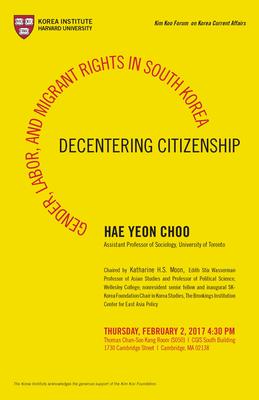Date:
Location:
Kim Koo Forum on Korea Current Affairs

Hae Yeon Choo
Assistant Professor of Sociology, University of Toronto
Hae Yeon Choo is Assistant Professor of Sociology and Affiliated Faculty of the Asian Institute
and the Women and Gender Studies Institute at the University of Toronto. Her first book,
Decentering Citizenship: Gender, Labor, and Migrant Rights in South Korea
(Stanford University Press, 2016), reveals citizenship as a language of social and personal
transformation within the pursuit of dignity, security, and mobility. Choo’s research centers on
gender, transnational migration, and citizenship to examine global social inequality.
Chaired by Katharine H.S. Moon, Edith Stix Wasserman Professor of Asian Studies and
Professor of Political Science, Wellesley College; nonresident senior fellow and inaugural
SK-Korea Foundation Chair in Korea Studies, The Brookings Institution Center for East Asia Policy
Abstract
Decentering Citizenship follows three groups of Filipina migrants'' struggles to belong in South Korea:
factory workers claiming rights as workers, wives of South Korean men claiming rights as mothers,
and hostesses at American military clubs who are excluded from claims?unless they claim to be
victims of trafficking. Moving beyond laws and policies, Hae Yeon Choo examines how rights are
enacted, translated, and challenged in daily life and ultimately interrogates the concept of citizenship.
Choo reveals citizenship as a language of social and personal transformation within the pursuit of
dignity,security, and mobility. Her vivid ethnography of both migrants and their South Korean advocates
illuminates how social inequalities of gender, race, class, and nation operate in defining citizenship.
Decentering Citizenship argues that citizenship emerges from negotiations about rights and belonging
between South Koreans and migrants. As the promise of equal rights and full membership in a polity
erodes in the face of global inequalities, this decentering illuminates important contestation at the
margins of citizenship.
The Korea Institute acknowledges the generous support of the Kim Koo Foundation.






